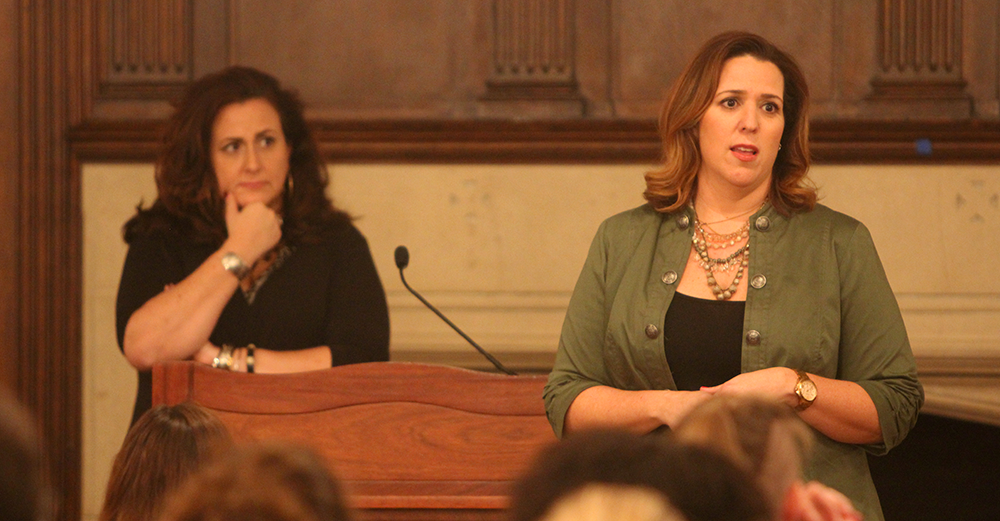
Founders of sexual assault prevention initiative One Student Kelly Addington, left, and Becca Tieder spoke about sexual violence at this year’s “Are You Ready?” on Thursday.
The 13th annual “Are You Ready?” event, a dialogue on sexual assault awareness and promotion of a survivor-orientated response culture, returned this year in Copley Formal Lounge on Thursday.
Health Education Services, Counseling and Psychiatric Services, and the Office of Residential Living sponsor the event each year in partnership with the LGBTQ Resource Center and the Division of Student Affairs.
The event kicked off Take Back the Night’s monthlong program for Domestic Violence Awareness Month, which includes further discussions with survivors of domestic violence and other commemorative events. Thursday’s event featured a talk by founders of sexual assault prevention initiative One Student Kelly Addington and Becca Tieder. The pair also created a sexual education card game, Sexversations, which encourages conversation about sex.
Addington, a rape survivor, encouraged the use of campus dialogue to confront issues of sexual assault. She highlighted the need to create safe spaces for survivors to come forward.
“Look … at the campus population as a whole and see what works with specific groups,” Addington said. “Help create a culture of consent and a space where survivors are comfortable coming forward.”
Addington described how she did not know she was raped until she started having nightmares and panic attacks, since the assault was drug-induced. She decided to take action after a particularly harrowing nightmare left her hysterical and led her to go to the gynecologist, where she learned she was pregnant.
“One morning I woke up screaming at the top of my lungs, crying uncontrollably,” Addington said. “I was sweating so badly that my pajamas were drenched. I was shaking.”
Addington said that she felt conflicting emotions after learning what had happened.
“I couldn’t help but think, ‘What did I say? What did I do?” Addington said. “‘What did I wear that night? How much did I drink? What did I say to him? How does this happen?’”
Addington added that she faced difficulty coping with recovery because she initially chose to be silent about the assault.
“‘This is my fault. This is my fault and I’ve got to fix this,’” Addington recalled thinking. “[But is] what happened to me … less of a rape because I had been drinking or because he was an invited guest in my home?”
Tieder, who was Addington’s good friend at the time of her rape, said that the day she learned Addington had been raped was a life-changing moment. As a result, the two have dedicated their lives to advocating survivor-friendly environments and healthy discussions of consensual sex.
“As her best friend, [I feared] that I failed her,” Tieder said. “Until we can create an environment where we can have healthy, honest conversations about consensual sex, we’re not going to create a survivor-friendly culture where they can come forward.”
Tieder also criticized what she called an “a.m./p.m.” mentality, in which friends of victims say or do one thing at night that they would never do during the day.
“Far too many people act differently or they’re not there for their friends, and that’s unacceptable,” Tieder said. “[People who leave] your friends behind, you’re the problem, not your friend who maybe had a couple of beers.”
After Addington and Tieder’s talk, more than 100 attendees broke off into smaller group discussions.
Carlo Izzo (COL ’17), a student facilitator of one of these discussions, said the discussions gave students a space to discuss difficult issues.
“There’s a lot of really enthusiastic students that want to have this conversation and they don’t find other places on campus to talk about it,” Izzo said. “Working to bring what these sessions are onto the rest of campus is what everyone’s really eager about.”




















